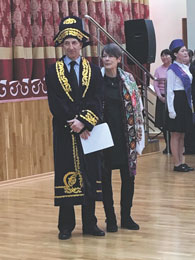A Year Teaching in Kazakhstan

A Year Teaching in Kazakhstan
Alan and Shelly with Alan wearing a traditional outfit presented to him by the school.
If you can’t place Kazakhstan - that is understandable. There are quite a few countries ending in ‘stan.’ Kazakhstan borders Russia, China, Kyrgystan, Uzbekistan and Turkmenistan and is not on the tourist routes. But Alan Simmonds, who spent last year teaching there, loved the experience.
He says, “We felt like an overseas adventure as we didn’t do our O.E. when we were young.” So he applied, was interviewed on Skype and soon after was offered the job. Whanganui High School gave him leave of absence and within five weeks he was in Kazakhstan just after Christmas 2016, half way through their school year. His wife Shelly arrived soon after.
They were based in the new capital of Astana in the north “built by the President using money from oil and soulless.” The January temperatures were minus 10 to minus 20 but “when it got to minus 30, it was genuinely cold.” Allan took his Kiwi Swanni and said “it was ok until it reached minus 10.”
They were given an apartment on the 9th floor in a 10 storied building. “It was built in the Soviet era – grey with a two person lift but at least it was well heated.” But it and the streets of the city, were very tidy. “If you dropped litter,” Alan explains, “You copped a large fine and if you couldn’t pay, you were jailed.”
Traditional food “which we felt compelled to eat at times included horse meat, better when cold, and mare’s milk. I really struggled with that. What we missed the most was fresh fish and peanut butter.” Otherwise they were able to get most types of food. “There were even Irish pubs,” Alan adds
“The standard of living was ridiculously cheap” – at least for them. Alan was paid monthly in US$, equivalent to 1.4million “Kazakhstani tenge”. The average monthly wage he says, “is around 50,000 tenge.” They also received accommodation and utilities, a US$2000 settling in grant and two return flights, the second one they used to go to Europe. Alan smiles when he says, “For the first time in our lives we felt rich.”
There were only eight international teachers in Astana and only four of those had English as their first language. Science, Economics and English were taught in English with other subjects taught either in the Kazakh language or in Russian, “which everyone can speak.”
Alan was to teach Economics but spent more time preparing local teachers for the international language exam IELTS. “English proficiency got you into the best universities and led to promotions, especially in teaching, so motivation was high.” He also taught English to senior management one on one.
His school day was from 8am to 5pm but the locals would teach on Saturdays as well. “This did lead to a little bit of resentment at the start,” he adds. The school was able to get the best teachers and they would be paid twice the salaries of others. However, international teachers were getting at least 10 times the salaries.
Nevertheless, “we were made to feel very welcome. It probably helped that I was an older, married man with a family, as single male teachers did have a bad reputation.” Alan also travelled to school by school bus.
Kazakhstan is a Muslim country and they would hear the call to prayer five times a day. “We never felt uncomfortable, unlike in Manchester, on ‘Curry Mile’ where we were stared at.” They had access to the BBC on TV and much to Alan’s delight he could also watch English Premier League football. About 30% of Kazakhs are Russian Orthodox Christian.
In the evenings, Alan and Shelly would go to up market restaurants and bars. Entertainment was karaoke singing. “I could sing all the English songs which gave me confidence. We made all our local friends there.”
Their first request for permission to take a three day holiday out of Astana was declined. They found out later that some dis-satisfied international teachers took the opportunity to go home. Having proved their stick ability, they would take short holidays mainly in the old capital of Almaty, the cultural and cosmopolitan centre of the country.
Shelly kept busy by walking and checking out “the most wonderful markets in summer.” Near the end of their stay she taught teenagers English in a language conversation club.
They were tempted to stay on as they loved “living in a different culture and the people were so friendly.” But in the last few months “we got a bit homesick and then there was the security of the job. Actually coming back was hard. For a while we wanted to go back to Kazakhstan.”
By Doug Davidson
River City Press 13/9/18
